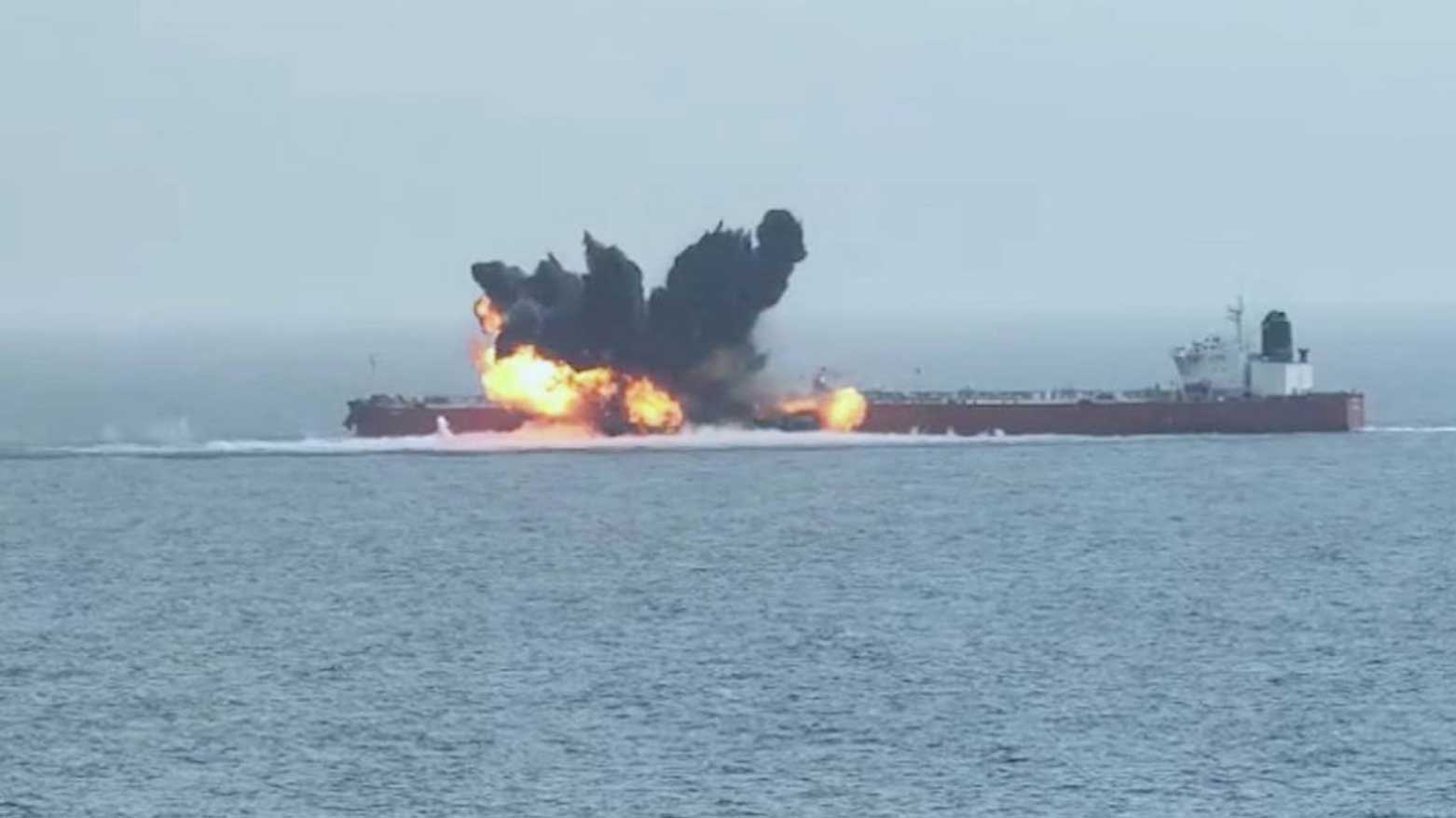Suspected Houthi Strike Sets Vessel Ablaze in Gulf of Aden, Reviving Regional Fears
The Houthis’ campaign against international shipping has increased insurance costs and forced several major shipping lines to reroute vessels around the Cape of Good Hope, adding weeks and millions of dollars to delivery costs.

ERBIL (Kurdistan24) — A commercial ship caught fire on Saturday in the Gulf of Aden off Yemen after being hit by a projectile, the British military said, as tensions in one of the world’s most vital maritime routes continue to escalate following months of attacks linked to Yemen’s Iran-backed Houthi rebels.
The United Kingdom Maritime Trade Operations (UKMTO) confirmed the incident, saying it occurred approximately 210 kilometers (130 miles) east of the port city of Aden.
“A vessel has been hit by an unknown projectile, resulting in a fire,” UKMTO reported. “Authorities are investigating.”
According to the private maritime security firm Ambrey, the vessel was a Cameroon-flagged tanker traveling from Sohar, Oman, to Djibouti when it came under fire.
Radio communications suggested the crew was preparing to abandon ship as a search-and-rescue operation was launched in the area.
No group has immediately claimed responsibility for the attack, though suspicion has fallen on Yemen’s Houthi movement, which has frequently targeted commercial vessels in the Red Sea and Gulf of Aden since late 2023.
The Iran-backed rebels, who control much of northern Yemen, have claimed their maritime operations are intended to pressure Israel over its military campaign in Gaza.
The latest incident underscores the fragile security environment in the Red Sea corridor — a vital trade artery connecting Europe and Asia via the Suez Canal.
The Houthis’ campaign against international shipping has disrupted global trade, increased insurance costs, and forced several major shipping lines to reroute vessels around the Cape of Good Hope, adding weeks and millions of dollars to delivery costs.
Since the start of their maritime offensive, at least nine sailors have been killed and four ships sunk, according to international monitoring agencies. The most recent attack before Saturday’s incident occurred on September 29, when the Houthis struck the Dutch-flagged cargo vessel Minervagracht, killing one crew member and injuring another.
The Houthi attacks have largely declined since a ceasefire between Israel and Hamas took effect on October 10, but the group has continued to threaten regional stability.
Military experts warn that the lull in operations might be temporary as the Houthis seek to maintain leverage amid shifting regional power dynamics.
Beyond their maritime campaign, the Houthis have also increased provocations on land. In recent weeks, they have threatened Saudi Arabia with renewed missile and drone attacks and detained dozens of employees from UN agencies and humanitarian organizations, accusing them—without evidence—of espionage.
The United Nations and other international actors have condemned the arrests as baseless and politically motivated.
Western intelligence officials have repeatedly accused Iran of supplying advanced weaponry and intelligence support to the Houthis, enabling their ability to target vessels far beyond Yemen’s territorial waters. Tehran denies these allegations, claiming its support is purely political.
The Gulf of Aden serves as a crucial link between the Arabian Sea and the Red Sea, forming part of the main maritime route for global energy supplies and goods.
Roughly 12% of global trade, worth around $1 trillion annually, transits through this corridor. Any escalation in hostilities threatens to disrupt international commerce and energy markets.
Maritime security experts warned that the latest incident could mark the start of a renewed wave of attacks after a brief period of calm, noting that even a single successful strike can send shockwaves through the shipping industry and potentially prompt commercial carriers to once again avoid the Red Sea route.
As investigations continue, international navies operating under the U.S.-led Operation Prosperity Guardian are expected to step up patrols and surveillance in the Gulf of Aden to prevent further attacks and safeguard freedom of navigation in one of the world’s most critical waterways.